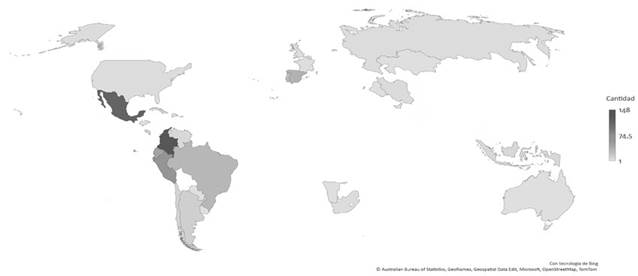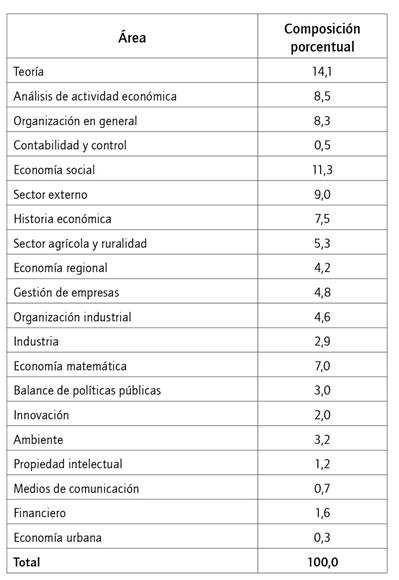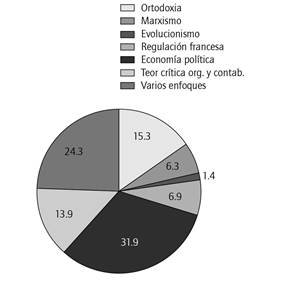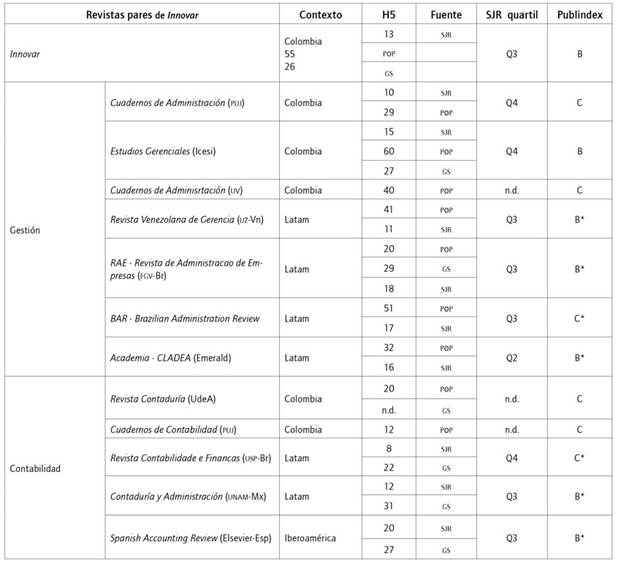I
The purpose of this editorial —prepared by Professor Juanita Villaveces, dean of the Faculty of Economic Sciences at the National University of Colombia (Bogotá campus), Álvaro Zerda, Professor and former dean of the same body, and myself, as director and editor-in-chief of Innovar journal— is to discuss the role of the publications of this faculty, and particularly this journal, as a means of dissemination and development of economic and administrative thought in our country, as a way to commemorate the seventieth anniversary of our faculty.
Traditionally, academic journals emerge from the intentions of an academic community. This is our case, since Innovar was an initiative by professors of an academic department aimed at disseminating their scholarly work and insights on management sciences. Over the years, changes in the measurement and classification systems of academic journals, as well as the search for greater transparency and reliability in the contents published, have limited the publication of works written by academics affiliated to the sponsoring institutions (i.e., editorial inbreeding control). This suggests that the continuity of a publication as a means for the dissemination of the progress and developments in a disciplinary field partly depends on its recognition and consolidation among target audiences, so that external academics and researchers become interested in submitting their articles for publication. The foregoing is an argument to indicate that the recognition of journals such as Cuadernos de Economía (created in 1979) and Innovar (in 1991) has been essential for their permanence for over 40 and 30 years of continuous publication, respectively. In its early days, Innovar was the channel that circulated the works of professors such as Bernardo Parra, the late Juan Abel Lara, and Eugenio Giovenardi, which addressed issues such as the financial situation and business strategy of recognized companies in the Colombian context, including Avianca and Fabricato (Parra, 1991; Parra, 1995), or the debate between positive and normative approaches in accounting research (Lara, 1991b), as well as some other contributions that demanded multidisciplinary perspectives in an attempt to answer questions that remain unsolved, such as, for example, why are farmers poor? (Giovenardi, 1992).
Besides showing the relevance of the research conducted in the Department of Administration, Finance and Social Sciences (currently the Management and Public Accounting School [eacp, in Spanish]) at the Faculty of Economic Sciences, these publications motivated authors from outside the University to gradually get involved in this editorial project. Over the years, Innovar became a recognized publication in the disciplinary fields of management and accounting, especially in the Spanish- and Portuguese-speaking worlds, as shown in figure 1. In this regard, today approximately 74% of our authors come from other countries1, especially Brazil, Ecuador, Peru, Mexico, and Spain.

Figure 1. Geographic origin of Innovar authors. Source: adapted from the report presented to the journal’s Editorial Committee number 62.
Although Innovar is currently an international journal, it has permanently served as a showcase for the intellectual production of the Faculty of Economic Sciences, and in particular the eacp, at the National University of Colombia. With the policy of prioritizing the editorial process of papers presented by this academic community, the journal continues to disseminate research in areas such as public administration, information and communication technology management, management and organizations, critical accounting, and accounting and finance.
The prestige and recognition gained by Innovar in the fields of management and accounting rise above the particular sphere of the journal, as it has represented the Faculty and the University before other academic communities. When a query is made in any database, not only the name of the journal is retrieved, but also that of the promoting or publishing institution; thus, the uninterrupted work for over 30 years of all the editors, committees and editorial teams, authors and reviewers, together with the fidelity of our readers, has also had an impact on the recognition of the Faculty of Economic Sciences at the National University of Colombia, and its eacp.
For the sake of clarity, I would like to invite you to compare Innovar with other peer journals in the fields of management and accounting using bibliometric data. From Table 1, which shows some citation indexes for thirteen academic journals, including Innovar, we can conclude that our journal is one of the best ranked. As observed, its H5 index is above the average for its peers, and it is the only publication in Colombia within its disciplinary field classified in Scimago Q3 category.
In short, it is expected that Innovar will continue to serve as a means of disseminating research in management and accounting, part of it carried out within the Faculty, taking into account that the aforementioned bibliographic results are not the product of chance or a conjuncture, but of the continuous and diligent work of a community and of State funding. Furthermore, the recognition of this publication and the institution that sponsors it will surely continue to motivate national and foreign professors and researchers to show their findings and recommendations in management and accounting through Innovar.
A plural and critical seal to understand the challenges of scientific disciplines and the country
Over the 70 years of the Faculty of Economic Sciences, the publications of the Editorial Center have been a two-way bet: on the one hand, they publicize the research of the University professors or conducted in conjunction with other researchers; on the other hand, they contribute to debates of academic and broad interest on issues of economic development. Both bets aim to be a scientific, cultural, and collective project of the nation in its mission to study and analyze national problems, as well as independently propose relevant formulations and solutions.
Thus, publications are not just an outreach project. Over the years, we have sought works with a critical and contributive sense to think about the country’s development in its multiple and changing dimensions, both in terms of the relevance of topics and the theories on which it is based and how development is understood from economic, social, organizational or accounting transparency capacities, that is, from the economic sciences.
Among these publications, I highlight three major groups of work: (i) those consistent with the idea of the Faculty to contribute to the development of the country. These works focus on the multiple facets of development both in theory and in its components for the country; (ii) the works in accounting and administrative areas that emerge later in the history of the publications as a result of the consolidation of these two disciplines of economic sciences; (iii) The works that have contributed to think about the disciplines from theory and its methods.
In terms of economic development, the work of the founders of the Faculty of Economic Sciences (fce) and of the Center for Development Research (cid, in Spanish) are noteworthy: Antonio García and Lauchlin Currie, respectively. Professor García’s works (1986) are emblematic in the understanding of development and the issues around lands in Colombia. Currie (1967) uses his experience of knowing the country extensively since his participation in the World Bank Mission in the 1950s. His look at development from education, teaching and public university is undoubtedly an analysis of the variables of development in Colombia.
There have been extensive contributions to understand the development from the participation of the agricultural economy, industry, the external sector, employment, and history. Thus, the works of Jesús Antonio Bejarano (1998; Bejarano & Pulido, 1986) on agriculture in Colombia are essential references for any researcher or policy maker who wants to understand the challenges of agriculture in Colombia. His critical look at the development model and the institutional constraints of the sector are still valid and explanatory of the sector’s dynamics of the sector more than 30 years after they were written. I emphasize the contribution for the sector and as a complement with the historical view that favors a long-term understanding of agriculture and its role in the economic development of Colombia since the mid-nineteenth century (Bejarano & Pulido, 1986). Concerns around the agrarian economy, its technological challenges, and its possibilities to contribute to development are also found in the works of Absalón Machado (1986, 2009, 2021), Astrid Martínez (1998), Gabriel Misas and Miriam Henao (1986), and the Mission of Studies for the Agricultural Sector (1990).
The interest in growth and development, economic models, their effects, and structural and historical roots (Bernal, 2009; Herrera & Moreno, 2016; Kalmanovitz, 1986), as well as sectoral analysis, also includes the paradigm of industrialization and its technological, innovation (Hernández, 2008; Zerda & Cortés, 2010), market and globalization restrictions (Bonilla et al., 1998; Misas & Corredor, 2001). The environmental, energy and public services, monetary and tax issues are also noteworthy (León, 2010; González & Zapata, 2005; Rincón et al., 2021). All share the plural and critical seal that characterizes the Faculty of Economic Sciences.
The analysis and understanding of development are not only focused on the sectoral view. They also open a discussion on the conditions and social effects of models of development and economic growth. Since the 1970s, titles on the distribution of urban income and, in the 1980s, on equity and social policy have been published; in 1985, they contributed to the debate on the disparate outcome of growth in the structure of employment and income that maintain high rates of poverty and inequality among population (Bonilla & González, 2007; Villalba de Sandoval & Urrutia, 1970).
The contribution to this aspect of development has been extensive in the publications of the Editorial Center of the fce, always with a critical view from perspectives such as socioeconomics and heterodox, institutional and historical approaches, which allow us to understand the structural reasons of the economy that favor growth while maintaining relatively rigid rates of poverty, inequality and informality. For example, César Giraldo (2018) presents a critical vision to the current paradigms of individualistic social policy around a redefinition of the subject of social policy towards the popular economy. In the same critical way, the works on the scope of social protection and the relationship between the Sta4te and social security policy, political power and the relationship with the market are a milestone in the understanding of social policy in Colombia (Arévalo, 2016, 2018; Corredor, 2010; Restrepo, 2010; Rodríguez, 2002).
In the second block of contributions, publications associated with the disciplines of administration and accounting, the two sisters of economics that make up the economic sciences, stand out. The inclusion of publications in these disciplines began in the 1980s, with works on accounting, auditing, internal control, accounting, and financial systems by Luis Carlos Beltrán (1980a), 1990a, 1990b) and Juan Abel Lara (1991a), which have been important for accounting education. The works in the areas of business management and organization in the late eighties and early nineties, such as those by Carlos Martínez Fajardo (1989) and Roberto Rosero (1990), which show a contribution to theory and practice, are also noteworthy. The participation of publications from these two disciplines is not a late entry, but a process of maturation of the two disciplines that began in the mid-sixties, almost two decades after the beginning of economics studies at Universidad Nacional de Colombia.
Finally, the third block of contributions corresponds to publications aimed at the theoretical debate and the contribution of the foundations and methods of the three disciplines. Among these, we could find the seminal works by Luis Lorente (1979, 2020), Homero Cuevas (1980) and José Félix Cataño (2009), (2013), and the contributions by Ricardo Bonilla, Jorge Iván González, Luis Carlos Beltrán, Carlos Eduardo Martínez (2007), 2012), Sergio Monsalve (2019), Óscar Benavides, Fernando Tenjo, and Francisco Lozano (2013). Although there are many topics that range from microeconomics to mathematical economics, political economy, organizational management, innovation, and accounting and auditing, these works have a common element: the challenge of presenting foreign theories and looking at Colombia with a critical perspective. Talking about general equilibrium or rational choice is not only done from the variables and hypotheses, but also from the limitations presented by the dominant theory or by including the discussion about the place and challenges of economic sciences from a perspective that includes the needs of the country (Ocampo et al., 2013).
Undoubtedly, a topic that appeals to me is the visibility of women in the publications of the fce Editorial Center. Very much in line with the slow incorporation of women into academia and particularly in the economic sciences, so too is the participation of books written or co-written by women. Since the 1980s, the works of Astrid Martínez (1982), 1996, a professor at the fce, and Consuelo Corredor (1985, 2001, 2010), dean between 1998 and 2002, are of note. However, the participation of women is shy —if not limited— with only 15.8% of the books written or co-written by women, very in line with their low historical presence as full-time professors at the fce. Other noteworthy Works are those by Edna Bonilla (2006), Liliana Chicaiza (2016), Zuray Melgarejo (2015), Zuray Melgarejo and Mary Vera (2013), and Beatriz Díaz (2022), all of them Professors at the fce. In summary, the long history of the publications of the fce and the fce Editorial Center reflects the seal that the Faculty and the University have built for the country: a reference of study and research that proposes alternative views to explain the theoretical and practical issues of interest of the disciplines and maintains a social and national sense to understand its problems. Thus, it has contributed to understand the dimensions of economic sciences for the country.
Undoubtedly, these are not all the issues and there are challenges for the present and the future that include the participation of women in publications and a broad look at the disciplines from South-South approaches that highlight even more the particularities of fragmented and diverse societies such as Colombia. Similarly, there is a responsibility to the new demands of the economic sciences: the energy transition, the environment at the heart of the economy, artificial intelligence, and its uses in accounting or new technologies and forms of organization. The publications will continue to be the critical and analytical account of the research in which professors participate. Therefore, the greatest challenge is to continue researching, fostering a critical Faculty and seeking answers for a more equitable, fair and transparent society.
III
The role of publications in the dissemination of the academic thought of the School of Economics (FCE) in its 70-year history. The seventy-year history of the FCE has been marked by the permanent research activity and academic production of its professors, which has been expressed in publications of various kinds.
Since the “prehistory” of the faculty, back in 1945, when the Institute of Economic Sciences, attached to the Faculty of Law, was created, to its formal establishment as the Faculty of Economic Sciences in 1952, its leaders were active writers: first, Professor Antonio García Nossa, promoter of the Faculty; then, Professor Lauchlin Currie, creator of the Center for Research for Development (CID). Both contributed with numerous and important writings on the economic thought and policy in Colombia and Latin America.
Their legacy was embraced by the generations of professors who succeeded them, to the point that the publications produced by the Faculty have fulfilled the intentions of these forms of university dissemination:
Contribute to the advancement of knowledge by allowing researchers and professors to share their findings and knowledge with the academic community, which in turn contributes to the advancement of research and the creation of knowledge.
Provide up-to-date and reliable information on advances in different areas of knowledge, which is especially important for university students, who need to know about the latest research and developments.
Improve the quality of education, to the extent that the teaching staff can access publications and use them to update their content in class and enrich their teachings.
Contribute to the reputation of the Institution, considering that university publications are an indicator of its quality and prestige; usually, the indicators of bibliographic production are considered for institutional evaluation processes.
Have an impact on society, because the proposals for action and the advances in knowledge generated can have practical applications in different areas and, consequently, positively affect the lives of people.
These purposes have been pursued from the schools (formerly departments) that make up the Faculty, as well as by the usual university means, including printed (and more recently virtual) books and the two journals of the faculty: Innovar and Cuadernos de Economía. In addition, the Faculty’s Editorial Center publishes virtual collections of working documents (grey literature), both by professors and students, which are widely disseminated in academic networks.
The systematic register of books published by the Faculty has identified and recovered a total of 171 titles produced since 19672, corresponding to the main areas of the economic discipline, as shown in table 2.
Table 2 Share of books published by the Faculty of Economics Sciences: 1973-2023.

Source: own elaboration based on the fce editorial catalogue.
Based on this percentage distribution, it can be concluded that the main research activity of the Faculty during its history has been aimed at economic theory and social economics, although there are other fields of interest, such as the analysis of economic activity and those related to reflection on organizations.
The books published from the perspective of the current of economic theory, which serves as a framework for research or analysis of economic aspects in general, allow assessing the different approaches that, from different perspectives, have characterized the Faculty and the contents it teaches in the classroom (figure 2).

Figure 2 Share of books published by the fce: 1973-2023. Source: own elaboration based on the fce editorial catalogue.
The share between different perspectives (figure 2) shows that the dominant perspective adopted in the analyses has been that of political economy, followed by a diversity of particular approaches and Marxism. It is worth noting that the orthodox current has recently gained space in the published contents; furthermore, the critical theory of organization and accounting has a notable presence in the academic literature produced at the Faculty.
In particular, the participation in the authorship (as authors or co-authors) by professors of the Faculty during all this time amounts to 25.7%. Finally, it should be noted that the Faculty’s periodical journals have also had an important national presence as a showcase for the reflections made by their teachers, to the point that at various times of their existence they have become reference points for the national academy, especially for those located outside Bogotá.
According to an analysis carried out by students of the Faculty in 2014, during its first years, Cuadernos de Economía—created in 1979—showed the predominance of publications in the areas of economic history and the history of economic thought, later focusing on the growth of topics related to microeconomics and macroeconomics, More recently, it has predominantly focused on the fields of econometrics, statistics, and mathematical economics (Farfán et al., 2014).
Innovar was created in 1991. For over 30 years, it “has had a disciplinary and interdisciplinary vocation” (Castañeda et al., 2022, p. 8), as stated by Professor Gómez Villegas, former journal editor-in-chief, who also highlights that the journal has been a fundamental space for the dissemination of research, professionals and researchers training, as well as “the construction of academic communities in the fields of management and accounting in the country” (p. 8).
In sum, it could be said that the role of publications in the dissemination of academic thought at the FCE in its 70 years of history has been very important, serving as a vehicle for the circulation of knowledge produced by its academic body, as well as by external authors, and has had an impact on the rest of the country’s academic community. In addition, according to the topics addressed, it has shed lights for the advancement of knowledge, the quality of education, and the analysis of theoretical and social problems in the three fields that make up the faculty: administration, accounting, and economics.
















